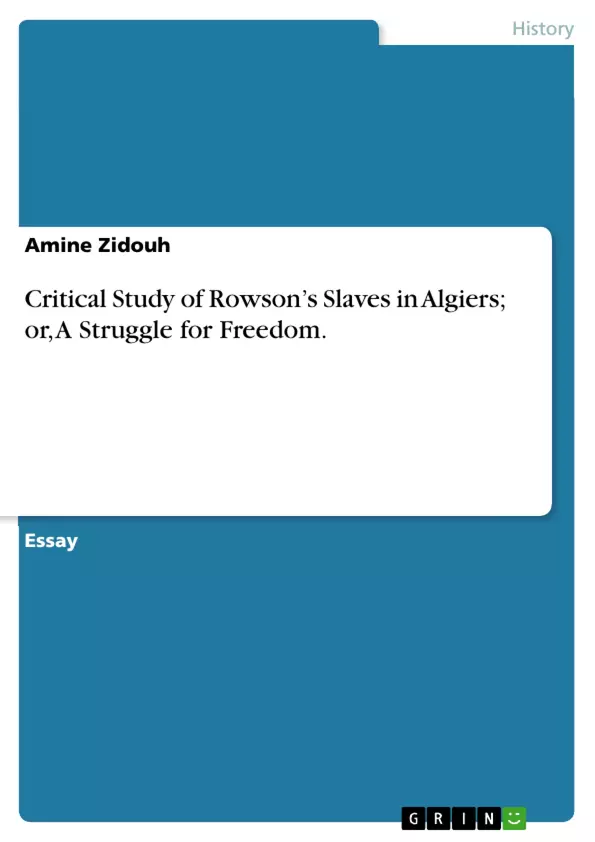Slaves in Algiers; or, A Struggle for Freedom (1794) is a play written by Susanna Haswell Rowson. The setting takes place in “Barbary” – the Mediterranean coast of North Africa – and more precisely in Algiers. The play centers on the lives of several American ‘slaves’ who plot their escape in an unflappable look for freedom. The relevance of studying a piece of literature - and more precisely, a play - stems from the idea that people in the time, used to watch plays, more than they would read books because plays were regarded as being more ‘entertaining’. In addition to that, although plays are a fictitious form of literature, they were always related to real events; hence the majority of people consider them as being true or as at least as referring to some real events. Another point would be that literature in that time was -often- judged on the basis of the moral values it contained. In that regard, Slaves in Algiers; or, A Struggle for Freedom is a rich document to be scrutinized with as much seriousness as when dealing with other sources that are considered as more ‘factual’. Therefore the need to study such a piece emanates from its very crucial role in shaping social reality , via its representation of ‘Barbary’ and its reflections over the nature of freedom, slavery and race.
Inhaltsverzeichnis (Table of Contents)
- Introduction
- The Setting and the Characters
- The Theme of Freedom
- The Theme of Slavery
- The Theme of American Superiority
- Rowson's Play and the Captivity Narrative Tradition
- Conclusion
Zielsetzung und Themenschwerpunkte (Objectives and Key Themes)
This critical study examines Susanna Haswell Rowson's play, Slaves in Algiers; or, A Struggle for Freedom (1794), focusing on its representation of 'Barbary' and its exploration of freedom, slavery, and race. The study aims to analyze the play's portrayal of American identity in relation to the "other," particularly the North African, within the context of its historical and cultural significance.
- The representation of 'Barbary' and its culture in the play
- The theme of freedom and its multiple interpretations within the play
- The concept of slavery and its various dimensions, including "splendid slavery"
- The portrayal of American superiority and its relationship to values, virtue, and civilization
- The connection between the play and the tradition of captivity narratives
Zusammenfassung der Kapitel (Chapter Summaries)
The study begins by introducing Rowson's play and its historical context, exploring its relevance to the study of American literature and the role of plays in shaping social reality. The subsequent chapters delve into the play's key themes: freedom, slavery, American superiority, and its connections to the captivity narrative tradition.
Schlüsselwörter (Keywords)
Key terms and concepts explored in this study include 'Barbary,' freedom, slavery, race, ethnicity, American superiority, captivity narratives, and the representation of the 'orient.' The study examines the play's use of these themes to shape perceptions of cultural difference and national identity.
Frequently Asked Questions
What is the significance of Susanna Rowson's play "Slaves in Algiers"?
The play is a crucial document for understanding early American perceptions of 'Barbary' (North Africa) and how literature shaped social reality regarding freedom and slavery.
What are the main themes explored in the play?
The primary themes include the nature of freedom, the ethics of slavery, American superiority, and the representation of the 'Oriental' other.
How does the play relate to the tradition of captivity narratives?
It draws on the popular 18th-century genre of captivity narratives, where Americans were captured by foreign powers, using these stories to define national identity and virtue.
Why was the setting of Algiers chosen for this play?
Algiers represented a place of conflict and exoticism for early Americans, serving as a backdrop to contrast American democratic values with North African autocracy.
How is American superiority depicted in the work?
Rowson portrays Americans as inherently virtuous and freedom-loving, suggesting their moral system is superior to that of their captors.
- Quote paper
- Amine Zidouh (Author), 2012, Critical Study of Rowson’s Slaves in Algiers; or, A Struggle for Freedom., Munich, GRIN Verlag, https://www.grin.com/document/191962



